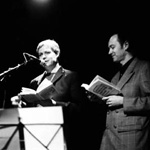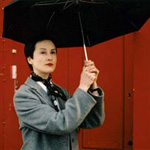Élfish
Values
Shop Around … pt 26

I would argue that in many ways the same passion pulses occasionally through seemingly stodgier pop publications, and in particular Record Collector. Their article on Louis Philippe is, for example, almost interchangeable with the Plan B one on ESG. The Louis Philippe feature was lovely, and a real eye-opener for me. I had no idea that following his season in él, he had accomplished so much. I was similarly aware that Jonathan Coe had used some Louis Philippe words at the start of What A Carve Up! But I had no idea they had collaborated on a spoken word/song cycle, which ridiculously was released only in France. Being a huge fan of Jonathan Coe’s writing I had to track down that disc. And so should you, as it’s wonderful. I really am into the idea of spoken word/music collaborations at the moment. Indeed I am very excited about the Ben Watt project of setting his short-stories to music, with guests including Robert Forster reading them, following the success of his spoken-word excursion with the great Estelle.
Anyway, elsewhere I saw Jonathan Coe cite the él compilation London Pavilion as one of the great lost records, and calling for a return to élfish values. It did make me dig out some él works, which I have to confess had got buried under the sands of time. I gather that over the past decade the él legend has grown. That’s no bad thing. For él was a colourful caper, with oodles of wit and flair, forging some sort of bond between Terry-Thomas and Huysman when most people were more interested in finding common ground between the Byrds and the funky drummer.
The nefarious Mike Alway started él after failing to get his own way as part of the Blanco y Negro set-up. He cultivated an air of foppish intellectual dilettantism, which was completely frowsty and faux actually. Along with his cronies Momus and the King of Luxembourg, you got the sense Alway was not as bright as he would like to have been. Nevertheless he was a visionary, a gifted graphics guy, and had a good ear for a magical melody.
Leaving aside releases from Felt and Vic Godard, the él compendium is filled with gems. The London Pavilion collections contain crackers from the likes of Louis Philippe, Always, Bid, Marden Hill and Would-Be-Goods. My choice cut would have to be the Klaxon 5’s 'Never Underestimate the Ignorance of the Rich', which is the best song the June Bride never recorded. If you are tempted to investigate, I’d push you in the direction of Marden Hill’s Cadaquez set, which is swinging ‘60s soundtrack/library/jazz beat with pop-scat vocals that wouldn’t sound out-of-place on one of the excellent Jazzman collections everyone should own and love. Think of music to create a mood for Julie Christie in Darling, or Audrey Hepburn and Albert Finney in Two For The Road with the Henry Mancini score and outfits by Paco Rabanne when such things mattered.
Interestingly Cadaquez at times is quite close to my current favourite record, Basil Kirchin’s Abstractions of the Industrial North, the very beautiful third in Trunk Records’ series of salvaged sets from the Kirchin archives. Indeed Trunk capture the spirit of él in their archaeological activities. And it should perhaps be noted Jonny Trunk contibutes an occasional soundtracks section to Record Collector, alongside the great Lois Wilson’s soul column.

Like a lot of people I thought él too arch, but with the
benefit of hindsight I suspect Alway was not as arch as he would have liked.
He gave out an air
of being a mad genius churning out bizarre pop creations. History has shown
that these creations were quite capable of standing on their own, and most
certainly have done. For besides the activities of Louis Philippe, which Record
Collector details, we can point to the Would-Be-Goods and the continuing
excellence of Jessica Griffin’s output in that guise. Rediscovering the él
excursion The
Camera Loves Me was an unexpected pleasure, but it’s almost nothing compared
to the Would-Be-Good’s
rather recent Brief
Lives foray on Fortuna Pop!
Jessica Griffin on Brief Lives shows she has a peerless way with words,
and it would be criminal for this record to fade away without due celebration.
The Jessica Griffin/Would-Be-Goods story goes along the lines that mad Monochrome
Set fan and something-in-the-city Jessica be marketed as something very special,
somewhere between Joan Greenwood and Nancy Sinatra. If at times she sounded
like Marianne Faithful, then it was a Marianne appearing in Godard’s Made
In USA having supplied the script and apposite cultural references rather than sitting in the corner of the bar singing prettily.
I think it should be mandatory that any songs that contain lines about saturnine
smiles should be instant hits. Elsewhere Jessica’s juxtaposition of an Echo and
the Bunnymen riff with lines like “the elegant rascal lives at Elephant and Castle
in a flat above the station, it’s a source of great frustration” (and references
to Tommy Nutter) could be something Saint Etienne’d kill for. Though in fairness
their Tales
From Turnpike House is about as lovely as you dare hope astute contemporary
pop could get. The duet between Sarah and David Essex on 'Relocate' is a very
wonderful thing. And their Finisterre is out on DVD soon from Plexifilm
who gave us the Galaxie 500 set and Sun Ra’s Space Is The Place.
When Jonathan Coe proposes a return to the days of él devilry you wonder whether
he is aware of Alway’s return to the fold with él as a salvage operation of
distinction. He has over the past year or so been quietly releasing some lovely
artefacts, predominantly on the exotica/strange soundtrack/experimental-middle-of-the
road side of things. There is, for example, a solo set from Os Mutantes’ Rita
Lee due any day soon, and a steady stream of Morricone mores have been emerging.
Of particular note is the Gabor Szabo double-set of “exquisite ‘60s jazz psychedelia
from the Nuryev of the guitar”. It contains the version of 'Some Velvet Morning'
I once heard Tim Gane spin in the early hours of a Sunday morning when I couldn’t
sleep and turned on the radio in despair. And, indeed, the new él
salvage operations sometimes seem like a privileged peek inside the record
collections of the likes of Gane, Bob Stanley, Broadcast, which is warmly welcomed.
Needless to say the Alway graphics are suitably swirly and bold, which means
he is still giving attention to detail. I wonder if he still gets as excited
about non-league football though?
© 2005 John Carney